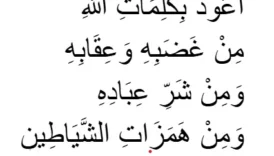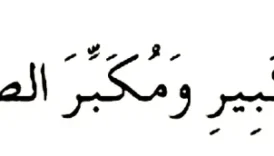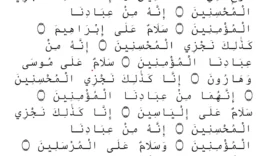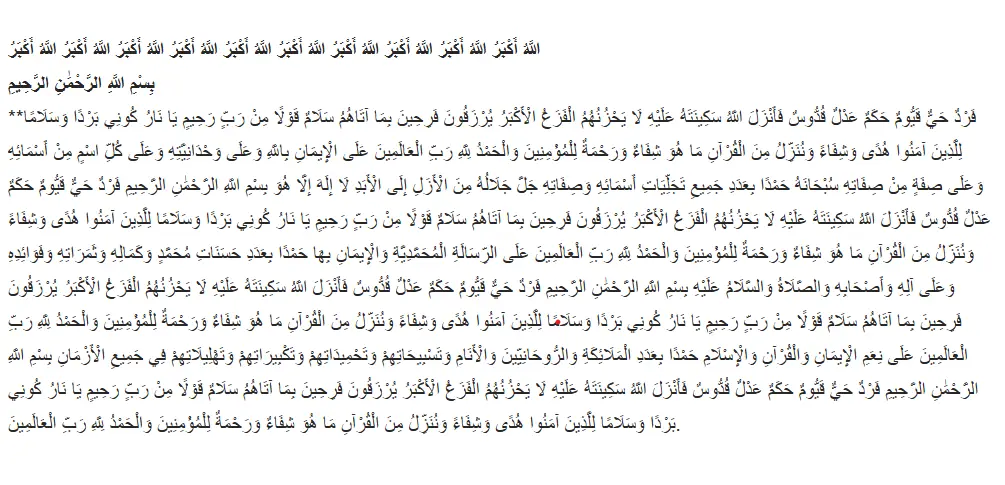Effective Duas Against Jinn: How to Build Your Spiritual Shield
Discover the most effective duas for protection from jinn and to achieve spiritual peace. Build your spiritual shield with Ayat al-Kursi, Surah Al-Falaq, and Surah An-Nas. This guide, in the light of the Quran and Sunnah, will show you the way. Incorporate these prayers into your life to purify yourself from evil and whispers.
- Effective Duas Against Jinn: How to Build Your Spiritual Shield
- The Foundation Of Protection: Supplications And Surahs
- Ayat Al-Kursi: Protection With The "Master Of Verses"
- Al-Mu'awwidhatayn (Surahs Al-Falaq And An-Nas): The Most Effective Way To Seek Refuge In Allah From Evil
- Surah Al-Falaq
- Surah An-Nas
- Amenerrasulu: The Two Verses Sufficient For The Night
- What Is Ruqyah And How Is It Performed? Spiritual Purification With The Quran
- Preparation For Ruqyah: Intention And Ablution
- Step-By-Step Ruqyah Application
- Habits That Strengthen Spiritual Protection In Daily Life
- Final Word
- Sources
The world of unseen beings is a source of curiosity and, for many, sometimes a source of anxiety. However, Islam clearly teaches us how to stand against such spiritual troubles and negative energies. The most powerful weapon in this stance, which is based on complete submission and the belief in seeking healing only from Allah, is dua (supplication). Let’s examine how we can build this spiritual shield in the light of authentic sources.
The Foundation Of Protection: Supplications And Surahs
Some surahs (chapters) and ayahs (verses) stand out more than others in terms of spiritual protection. These supplications, personally recommended by the Prophet Muhammad (peace be upon him), act as a spiritual armor.
Ayat Al-Kursi: Protection With The “Master Of Verses”
Ayat al-Kursi is the 255th verse of Surah Al-Baqarah and is considered the greatest verse of the Quran. Its profound meanings and the sublime attributes of Allah make it one of the most powerful spiritual weapons against the evil of Satan and malevolent beings. In the famous incident narrated by the companion Abu Hurayrah (may Allah be pleased with him), a thief who was stealing from the charity dates (who later turned out to be a satan) revealed a secret to him in exchange for his release: “When you go to bed, recite Ayat al-Kursi. If you do, a guardian from Allah will remain with you, and Satan will not approach you until morning.” Upon hearing this, the Prophet Muhammad (peace be upon him) said, “He told you the truth, though he is a liar.” (Bukhari, Wakalah, 10).
Arabic Script:
اَللّٰهُ لَٓا اِلٰهَ اِلَّا هُوَۚ اَلْحَيُّ الْقَيُّومُۚ لَا تَأْخُذُهُ سِنَةٌ وَلَا نَوْمٌۜ لَهُ مَا فِي السَّm_وَاتِ وَمَا فِي الْاَرْضِۜ مَنْ ذَا الَّذ۪ي يَشْفَعُ عِنْدَهُٓ اِلَّا بِاِذْنِه۪ۜ يَعْلَمُ مَا بَيْنَ اَيْد۪يهِمْ وَمَا خَلْfَهُمْۚ وَلَا يُح۪يطُونَ بِشَيْءٍ مِنْ عِلْمِه۪ٓ اِلَّا بِمَا شَٓاءَۚ وَسِعَ كُرْسِيُّهُ السَّm_وَاتِ وَالْاَرْضَۚ وَلَا يَؤُ۫دُهُ حِفْظُهُمَاۚ وَهُوَ الْعَلِيُّ الْعَظ۪يمُ
Transliteration:
Allāhu lā ilāha illā huwal-ḥayyul-qayyūm, lā ta’khudhuhu sinatun wa lā nawm, lahu mā fis-samāwāti wa mā fil-’arḍ, man dhalladhī yashfa‘u ‘indahu illā bi-idhnih, ya‘lamu mā bayna aydīhim wa mā khalfahum, wa lā yuḥīṭūna bishay’in min ‘ilmihī illā bimā shā’, wasi‘a kursiyyuhus-samāwāti wal-’arḍ, wa lā ya’ūduhū ḥifẓuhumā, wa huwal-‘aliyyul-‘aẓīm.
Meaning:
Allah! There is no god but He – the Living, The Self-subsisting, Eternal. No slumber can seize Him nor sleep. His are all things in the heavens and on earth. Who is there can intercede in His presence except as He permitteth? He knoweth what (appeareth to His creatures as) before or after or behind them. Nor shall they compass aught of His knowledge except as He willeth. His Throne doth extend over the heavens and the earth, and He feeleth no fatigue in guarding and preserving them for He is the Most High, the Supreme (in glory).
Al-Mu’awwidhatayn (Surahs Al-Falaq And An-Nas): The Most Effective Way To Seek Refuge In Allah From Evil
Surahs Al-Falaq and An-Nas are known by the name “Al-Mu’awwidhatayn,” which means “the two chapters of refuge.” After these two surahs were revealed, the Prophet Muhammad (peace be upon him) adopted them in place of other supplications for seeking refuge (Tirmidhi, Tibb, 16). These surahs teach us to seek refuge directly in Allah from the evil of what He has created, from the darkness of the night, from the evil of sorcerers, and from the evil of the envious.
Surah Al-Falaq
Arabic Script:
قُلْ اَعُوذُ بِرَبِّ الْفَلَقِۙ ﴿١﴾ مِنْ شَرِّ مَا خَلَقَۙ ﴿٢﴾ وَمِنْ شَرِّ غَاسِقٍ اِذَا وَقَبَۙ ﴿٣﴾ وَمِنْ شَرِّ النَّفَّاثَاتِ فِي الْعُقَدِۙ ﴿٤﴾ وَمِنْ شَرِّ حَاسِدٍ اِذَا حَسَدَ ﴿٥﴾
Transliteration:
Qul a‘ūdhu birabbil-falaq. Min sharri mā khalaq. Wa min sharri ghāsiqin idhā waqab. Wa min sharrin-naffāthāti fil-‘uqad. Wa min sharri ḥāsidin idhā ḥasad.
Meaning:
Say: “I seek refuge with the Lord of the Dawn; from the mischief of created things; from the mischief of Darkness as it overspreads; from the mischief of those who practice secret arts; and from the mischief of the envious one as he practices envy.”
Surah An-Nas
Arabic Script:
قُلْ اَعُوذُ بِرَبِّ النَّاسِۙ ﴿١﴾ مَلِكِ النَّاسِۙ ﴿٢﴾ اِلٰهِ النَّاسِۙ ﴿٣﴾ مِنْ شَرِّ الْوَسْوَاسِ الْخَنَّاسِۙ ﴿٤﴾ الَّذ۪ي يُوَسْوِسُ ف۪ي صُدُورِ النَّاسِۙ ﴿٥﴾ مِنَ الْجِنَّةِ وَالنَّاسِ ﴿٦﴾
Transliteration:
Qul a‘ūdhu birabbin-nās. Malikin-nās. Ilāhin-nās. Min sharril-waswāsil-khannās. Alladhī yuwaswisu fī ṣudūrin-nās. Minal-jinnati wan-nās.
Meaning:
Say: “I seek refuge with the Lord and Cherisher of Mankind, the King (or Ruler) of Mankind, the god (or judge) of Mankind, from the mischief of the Whisperer (of Evil), who withdraws (after his whisper), (the same) who whispers into the hearts of Mankind, among Jinns and among men.”
Amenerrasulu: The Two Verses Sufficient For The Night
The last two verses of Surah Al-Baqarah (285-286) are known as “Amenerrasulu.” Regarding the virtue of these verses, the Prophet Muhammad (peace be upon him) said: “Whoever recites the last two verses of Surah Al-Baqarah at night, they will be sufficient for him (against all evils).” (Bukhari, Fada’il al-Qur’an, 10; Muslim, Salat al-Musafirin, 255). This is not just an act of recitation, but a state of affirming the fundamental principles of faith with the heart and tongue.
What Is Ruqyah And How Is It Performed? Spiritual Purification With The Quran
Ruqyah literally means “to treat by reciting and blowing.” The permissible (shar’i) ruqyah in Islam is a method of seeking spiritual healing by reciting Quranic verses and supplications with the consciousness that healing comes only from Allah, containing no elements of shirk (polytheism) or haram (forbidden acts). Aisha (may Allah be pleased with her) narrated that when the Prophet Muhammad (peace be upon him) fell ill, he would recite the Mu’awwidhatayn over himself, blow, and then wipe his body with his hands (Bukhari, Tibb, 39).
Preparation For Ruqyah: Intention And Ablution
Before performing ruqyah, it is beneficial for both the reciter and the person being recited upon to be in a state of ablution (wudu), as it increases the spiritual effect. The most important step is the intention (niyyah). The intention should be made in the heart, such as: “O Allah, I intend to seek purification and healing from this spiritual affliction through the means of Your healing words and with Your permission.”
Step-By-Step Ruqyah Application
- Joining the Hands: The hands are joined together with the palms facing up.
- Recitation and Blowing: Surah Al-Fatihah, Ayat al-Kursi, Surah Al-Ikhlas, Surah Al-Falaq, and Surah An-Nas are recited. A light blow is made into the palms after each surah or after the entire recitation is complete.
- Wiping the Body: With the hands that have been recited upon, one wipes their body, starting with the head, then the face, and then all accessible parts of the body, with the intention of healing.
- Repetition: This process is usually repeated three times.
- Reciting over Water: Reciting the same supplications over a container of clean water, then drinking from it and performing ghusl (full-body ablution) with it, is also a common and effective ruqyah method.
Habits That Strengthen Spiritual Protection In Daily Life
Spiritual protection is not just an act performed at specific times but a way of life. Saying “Bismillah” (In the name of Allah) when entering and leaving the house, and before eating; starting every task with “A’udhu Billahi minash-shaytanir-rajim” (I seek refuge in Allah from the accursed Satan); staying in a state of ablution as much as possible; and remembering Allah throughout the day keeps the spiritual shield constantly active.
Final Word
The most effective weapon against the evil of jinn and unseen beings is undoubtedly a firm faith in Allah and complete submission to Him. Supplications and surahs are the most concrete manifestation of this faith and submission, the strongest bond between us and our Lord. When we make these prayers a part of our lives, we not only protect ourselves but also fill our hearts with peace and tranquility. Remember, the greatest protector and the most loyal friend is Allah, the Lord of the worlds.
Sources
- al-Bukhārī, Muḥammad b. Ismā‘īl. al-Jāmi‘ al-Ṣaḥīḥ.
- Muslim, b. al-Ḥajjāj. al-Jāmi‘ al-Ṣaḥīḥ.
- al-Tirmidhī, Muḥammad b. ‘Īsā. al-Sunan.





